List of Afghans
The following is a list of notable Afghan people, which includes all the ethnic groups of the modern state of Afghanistan. Afghanistan has gone through territorial changes. This list generally excludes Ethnic Pashtuns who originate from regions that were not controlled by Afghanistan at the time, though there are exceptions for certain figures who are prominent to Pashtuns. It also includes historical figures coming from the present day borders of Afghanistan, even if they were non-Pashtuns.
Monarchs
- Humayun (reigned 26 December 1530 – 17 May 1540) Second Mughal emperor
- Demetrius I of Bactria (c. 200 – c. 180 BCE) King of Bactria
- Eucratides I (reigned 171–145 BC) King of the Bactrian Empire
- Menander I (reigned 165/155–130 BC) Indo-Greek king
- Mahmud of Ghazni (reigned 998 – 30 April 1030) Sultan of the Ghaznavid Empire
- Ghiyath al-Din Muhammad (reigned 1163 – 11 February 1203) Sultan of the Ghurid Empire
- Muhammad of Ghor (reigned 1173–1202) Sultan of the Ghurid Sultanate
- Muhammad Shah (reigned 27 September 1719 – 26 April 1748) 13th Mughal Emperor
- Abu Sa'id Mirza (reigned Samarkand: 1451–1469,Herat: 1459–1469) Ruler of the Timurd empire
- Alauddin Khalji (reigned 19 July 1296 – 4 January 1316) Turco-Afghan Ruler of Delhi Sultanate
- Ulugh Beg II (reign 1461–1502) Timiurd Ruler of Kabul and Ghazni
- Abul-Qasim Babur Mirza Timiurd Ruler of khorasan
- Sher Shah Suri (1537 – 22 May 1545) Founder of the Suri Empire in India,
- Sultan Husayn Bayqara (reigned 1469 – 4 May 1506) Amir of the Timurid Empire
- Ahmad Shah Durrani (1747–1772) was the founder of the Durrani Empire and is regarded by some (though there is no historical record) as the founder of the modern state of Afghanistan
- Jalal-ud-din Khalji (reigned 13 June 1290 - 19 July 1296) Founder of the Khalji dynasty, 12th Ruler of the Delhi Sultanate
- Kalu Khan Yousufzai - Yousufzai Afghan monarch of Khyber Pakhtunkhwa. known for the Battle of Malandari Pass (1586)
Presidents
- Daoud Khan
- Nur Muhammad Taraki
- Mohammad Najibullah
- Burhanuddin Rabbani
- Hamid Karzai
- Ashraf Ghani-served as the fifth president of Afghanistan,and as the second and final president of the Islamic Republic of Afghanistan.
Politicians and diplomats
- Muhammad Yunus Nawandish, was the Mayor of Kabul from after his appointment by Afghan President Hamid Karzai in January 2010
- Mohammad Siddiq Chakari
- Abdul Ahmad Zahedi Niqala
- Wahid Omar
- Amrullah Saleh the second Panjshir resistance
- Rafael Pinhasi Israeli politician
- Mahmud Tarzi Afghan politician and intellectual, known as founder of Afghan journalism
- Mohammad Ibraheem Khwakhuzhi
- Zalmay Khalilzad Afghan-American diplomat and foreign policy expert
- Rangin Dadfar Spanta
- Gulbuddin Hekmatyar
- Ali Ahmad Khan Afghan politician and self proclaimed Emir of Afghanistan for a few weeks
- Ismael Balkhi Hazara political leader and reformist
- Abdul Rahman Pazhwak diplomat, scholar and poet
- Abdul Qadir (Afghan communist) Afghan politician, diplomat, and military officer
- Mohammed Aziz Khan Afghan prince and diplomat
- Abdur Rahim Khan (governor) Afghan governor of Herat
- Abdul Rashid Dostum Afghan warlord
- Juma Khan Hamdard governor of Paktia Province from 2007 to 2015
- Al-Sari ibn al-Hakam(died November 820) served twice as the Abbasid Caliphate's governor of Egypt.
- Sayed Mohammad Ali Jawid Afghan politician
- Khairullah Khairkhwa current Afghan Minister of Information and Culture and a former Minister of the Interior.
- Kubra Noorzai Afghan politician. She was the first woman to become a government minister in the country.
- Nasima Razmyar Afghan-Finnish politician, elected to the Finnish Parliament in 2015
- Mohammad Nabi Omari Afghan politician, governor of Khost province and held for nearly twelve years in extrajudicial detention in the United States Guantanamo Bay
- Abdul Ali Mazari political leader of the Hezb-e Wahdat party
- Ahmad ibn Nizam al-Mulk born in Balkh, Persian vizier of the Seljuq Empire and then the Abbasid Caliphate.
- Shah Mahmud Khan Prime Minister of Afghanistan from May 1946 to 7 September 1953, under King Mohammed Zahir Shah's monarchy
- Abdul Hadi Dawi Afghan poet, diplomat and government official.
Military figures
- Kamal al-Din Gurg (died late 1315 or early 1316), general of the Delhi Sultanate ruler Alauddin Khalji.
- Adham Khan general of Akbar the Great, third Mughal empire
- Mullah Omar Mujahideen leader, co-founder of the Taliban and served as its first leader
- Ahmad Shah Massoud military commander
- Jalaluddin Haqqani Afghan insurgent commander who founded the Haqqani network
- Ala al-Dawla Mirza Timurid prince and a grandson of the Central Asian ruler Shah Rukh
- Bairam Khan military commander and commander-in-chief of the Mughal army
- Wazir Akbar Khan Afghan prince, general and Emir
- Habibullāh Kalakāni leader of the Saqqawists
- Abdul Qadir (Afghan communist) military officer in the Afghan Air Force
- Commander Shafi Hazara ethnic Hazara military commander in Afghanistan
- Kabir Andarabi military official
- Abdul Rasul Sayyaf Mujahideen commander
- Dadullah Taliban's senior military commander in Afghanistan until his death in 2007
- Obaidullah Akhund Defence Minister in the Afghan Taliban government of 1996–2001
- Amin Wardak major Afghan Mujahideen leader
- Abdul Raziq Achakzai Afghan Army Lieutenant General and Police Chief, considered to be one of the most powerful security officials in Afghanistan for the last few years of his life
- Tahir ibn Husayn General and Governor of Khurasan during the Abbasid caliphate
- Masrur al-Balkhi senior military officer in the late-9th century Abbasid Caliphate
- Azad Khan Afghan military commander
- Sardar Shah Wali Khan political and military figure in Afghanistan
- Mohammad Akram, vice Chief of Staff of the Afghan National Army; died in a suicide attack in 2005.
Scientists
- Jamal ad-Din al-Afghani – philosopher
- Hedayat Amin Arsala – economist
- Mohammad Amin Fatemi – physician
- Nake M. Kamrany – professor of economics
- Habib Mangal – physician
- Abdul Ahad Mohmand – astronaut, he became the first Afghan citizen and the fourth Muslim to visit outer space, he also made Pashto the 4th spoken language in space.
- Abdul Karim Mustaghni
- M. Ishaq Nadiri – professor of economics
- Ghulam Faroq Nijrabi – physician
- Abbas Noyan – engineer
- Hamidullah Qalandarzai – engineer
- Mohammad Qayoumi – engineer; president of San Jose State University
- Daud Shah Saba – geologist
- Sima Samar – physician
- Habiba Sarobi – hematologist
- Nazif Shahrani – professor of anthropology
- Kabir Stori – psychologist
- Zemaryalai Tarzi – archeologist
- Abdul Qayum Tutakhail – physician
- Ghulam Sediq Wardak – inventor
- Abu Ma'shar al-Balkhi – astrologer
- Abu Zayd al-Balkhi (850–934) – geographer and mathematician
- Al-Muqanna – chemist, also known for leading an Islamic revolt and claiming to be a prophet
- Al-Sijzi – Muslim astronomer, mathematician, and astrologer
Entrepreneurs
Historians
- Abu Mansour al-Hosein ibn Muhammad al-Marghani
- Hamid Naweed
- Akram Assem
- Ghulam Mohammad Ghobar (1898–1978)
- Zalmay A. Gulzad
- Abdul Hai Habibi (1910–1984)
- Faiz Mohammad Katib Hazara
- Omara Khan Massoudi – geographer, historian
- Abdul Shakoor Rashad (1921–2004)
- Abd al-Razzaq Samarqandi – chronicler and Islamic scholar
- Khvandamir
- Mohammad Rauf Mehdi
Media people (including actors and film directors)
- Latif Ahmadi – director of Afghan Film, Afghanistan's state-run film company
- Leena Alam – actress
- Siddiq Barmak (born 1962) – directed the drama film Osama (2003)
- Abdul Ghafoor Breshna – painter, music composer, poet and film director
- Sonia Nassery Cole – directed the drama film The Black Tulip (2010)
- Zohre Esmaeli (born 1985) – model, author, designer
- Fahim Fazli – actor, author, modification speaker, cultural technical advisor for US Marines
- Azita Ghanizada
- Marina Golbahari
- Nelufar Hedayat
- Haji Kamran
- Kader Khan
- Ahmed Latif
- Ahmad Khan Mahmidzada
- Mamnoon Maqsoodi (born 1966)
- Anisa Wahab
- Abdul Wahid Nazari (born 1953)
- Nelofer Pazira
- Dr. Hafiz Sahar (1928–1982)
- Soosan Firooz
- Yalda Hakim
- Atiq Rahimi – French-Afghan filmmaker, writer
Writers (including journalists)
- Mohammad Jan Fana (born 1932)
- Nelufar Hedayat
- Khaled Hosseini (born 1965)
- Hafizullah Khaled
- Qiamuddin Khadim
- Sultan Munadi (1976–2009)
- Fariba Nawa (born 1973)
- Nelofer Pazira
- Dr. Hafiz Sahar (1928–1982)
- Sayed Ihsanuddin Taheri
- Mahmud Tarzi (1865–1933)
- Sakena Yacoobi
- Rahnaward Zaryab
- Ahmad Javeed Ahwar
- Tamim Ansary
- Homeira Qaderi
- Gul Mohamad Zhowandai
- Leila Christine Nadir
- Abu Ubaid al-Qasim bin Salam (770–838) philologist and the author of many standard works on lexicography, Qur’anic sciences
- Abu Mansur al-Azhari (895–980) lexicographer, philologist and grammarian of Arabic; prominent philogist of his time
- Abdul Khaliq Hussaini journalist, activist
- Aziz Ullah Haidari journalist
- Chékéba Hachemi Afghan feminist and writer
- Mohammad Haider Zhobal history writer
Poets
- Jalāl ad-Dīn Mohammad Rūmī the great Sufi mystic and poet of 13th century
- Khwaja Abdullah Ansari
- Hafizullah Khaled
- Hamza Baba (1907–1994) Sage of Herat, the great Sufi mystic of 11th century
- Rahman Baba (1650–1715)
- Wasef Bakhtari
- Khalilullah Khalili (1907–1987)
- Ghani Khan (1914–1996)
- Khushal Khan Khattak (1613–1689)
- Latif Nazemi (born 1947)
- Parween Pazhwak (born 1967)
- Pir Roshan (1525–1582/1585)
- Sana Safi
- Layla Sarahat Rushani (died 2004)
- Hakim Sanai (1080–1131)
- Kabir Stori (1942–2006)
- Mahmūd Tarzī (1830–1900)
- Nazo Tokhi
- Qahar Asi (1956–1994)
- Wasef Bakhtari
- Mohammad Hashem Zamani
- Rabia Balkhi from the city of Balkh, possibly the first female poet of Persian literature
- Abu al-Fath al-Busti (942–1010)
- Abdul Bari Jahani Afghan poet, most notable work is the national anthem of the Islamic Republic of Afghanistan
- Makhfi Badakhshi
- Nadia Anjuman
- Abdul Rahman Pazhwak (1919–1995)
- Ali-Shir Nava'i (1441–1501) poet, writer, politician, linguist, mystic and painter
- Unsuri 10-11th century Persian poet, from Balkh
- Matiullah Turab[1]
Artists
- Dust Muhammad – born in Herat, Persian painter of miniatures, calligrapher, and art historian. Disciple of Kamāl ud-Dīn Behzād
- Kamāl ud-Dīn Behzād – (1455–1535), painter
- Ali-Shir Nava'i – (1441–1501)
- Mariam Ghani – visual artist, photographer, filmmaker
- Lida Abdul – video artist and performance artist
- Malina Suliman – graffiti artist, metalworker, and painter
- Abdul Ghafoor Breshna – one of Afghanistan's most talented artists
- Shamsia Hassani – graffiti artist, a fine arts lecturer, and the associate professor of Drawing and Anatomy Drawing at the Kabul University
Religious figures
- Ibrahim ibn Adham – early ascetic Sufi saint
- Asif Mohseni – Afghan Twelver Shi'a Marja'
- Muqatil ibn Sulayman – scholar of Islam, wrote earliest, possibly first commentaries of the Quran
- Hiwi al-Balkhi – 9th century exegete and critic of the bible
- Ali Hujwiri – 11th-century sunni Muslim mystic, theologian and preacher.
- Shahid Balkhi – Persian theologian, philosopher, poet and Sufi. Famous Persian poet Rudaki has a poem in Balkhi's elegy.
- Ali al-Qari – Islamic scholar
- Haji Dost Muhammad Qandhari – Afghan Sufi master
- Sheikh Mohammad Rohani – Sufi cleric born around 1220 AD
- Abobaker Mojadidi – spiritual Muslim leader and socio-political activist
- Ahmed Gailani – was the leader of the Qadiriyyah Sufi order in Afghanistan
- Mirza Muhammad Ismail – Afghan religious scholar and the first convert to the Ahmadiyya faith
- Sultan Balkhi – 14th century Muslim saint, known for preaching Islam in Bengal
- Ibn Hibban – scholar, Muhaddith, historian and author of well-known works
Sportspeople
- Rashid Khan – cricketer, the ICC Men's T20I Player of the Decade
- Mohammad Nabi – cricketer, 1st in Allrounder rankings.
- Mujeeb Ur Rahman – cricketer
- Hamid Hassan – cricketer
- Hazratullah Zazai – cricketer, led Afghanistan to the highest T20I score of 278/3
- Rahmanullah Gurbaz – cricketer
- Qais Ahmad – cricketer
- Asghar Afghan – cricketer, Afghanistan's former captain and ended his career with the highest T20I wins as a captain.
- Rohullah Nikpai – first Afghanistan's Taekwondo Olympic winner of 2008 and 2012
- Mustafa Amini – Afghan-Australian footballer
- Javed Ahmadi – cricketer
- Sandjar Ahmadi – footballer
- Raees Ahmadzai – cricketer
- Yamin Ahmadzai – cricketer
- Shamsuddin Amiri – footballer
- Jan Alam Hassani – volleyballer
- Qaher Hazrat – cyclist
- Gulbadin Naib – cricketer
- Nasratullah Nasrat – cricketer
- Said Karimulla Khalili – Russian-Afghan biathlete
- Dawlat Zadran – cricketer
- Siyar Bahadurzada – UFC fighter
- Nadia Nadim – footballer
- Jeff Bronkey – Afghan-American former Major League Baseball pitcher
- Shamila Kohestani – footballer, and former captain of the Afghanistan women's national football team
- Hussain Sadiqi – Afghan Australian martial artist
- Khaleqdaad Noori – cricketer
- Moshtagh Yaghoubi – Afghan-born Finnish footballer
Musicians (including composers)
- Omar Akram – Grammy Award-winning Afghan-American recording artist, composer and pianist
- Aryana Sayeed
- Naghma
- Dawood Sarkhosh
- Farhad Darya
- Soosan Firooz – actress and rapper
- Mozhdah Jamalzadah
- Miri Maftun
- Latif Nangarhari
- Nasrat Parsa
- Ahmad Zahir
- Hangama
- Ahmad Wali
- Ubaidullah Jan – Pashto singer
- Nashenas – one of the oldest surviving musicians from Afghanistan
- Rukhshana – one of the first Afghan female singers
- Rahim Bakhsh
- Abdul Rahim Sarban – singer
- Nainawaz – artist, poet and composer; composed some of the most iconic pieces in Afghan popular music
Female activists
- Sima Samar – human rights, democracy, first Afghan's Noble award candidate
- Aryana Sayeed – women's rights activist and famous singer
- Roqia Abubakr
- Sitara Achakzai – women's rights activist
- Jamila Afghani – founder of Noor Educational and Capacity Development Organization (NECDO)
- Safia Ahmed-jan – women's rights activist
- Khadija Ahrari – helped give women the right to vote
- Fatema Akbari
- Farida Azizi – advocate for peace and women's rights.
- Marzia Basel – advocate for women's education
- Mariam Ghani – artist and advocate for women's rights
- Laila Haidari (born 1978)[2]
- Malalai Joya (born 1978)
- Fawzia Koofi
- Anahita Ratebzad (1931–2014)
- Masuma Esmati Wardak
- Manizha Wafeq[3]
- Asila Wardak
Others
- Safi Rauf (born 1994)
- Ahmad Massoud (born 1989)
- Sharbat Gula (born 1972)
- Mir Masjidi Khan (died 1841) – Afghan resistance leader
- Youssof Kohzad – writer, painter, playwright, artist, poet and actor
- Abdul Majid Zabuli (1896–1998) – founder of Bank-e-Melli Afghanistan
- Zallascht Sadat – model
- Vida Samadzai model
- Khwaja Usman – Mughal opponent, Baro-Bhuyan chieftain
- Abdul Latif Pedram – professor of literature
- Azizullah Royesh – social activist
- Al-Farabi (872–950) early Islamic philosopher and polymath; also known as Alpharabius in the west
- Razia Muradi (born 1995/1996) academic
- Abdul Khaliq Hazara – assassin
- Ghulam Muhammad Tarzi – soldier, poet, and military leader
- Nur Jahan – Empress consort of Mughal Empire
- Khalid ibn Barmak – born in Balkh, 8th century Soldier and administrator
- Robert Joffrey – born Anver Bey Abdullah Jaffa Khan to Afghan father and Italian mother; choreographer, dancer, director
- Afghana – tribal chief or prince of Pashtuns, traditionally considered the progenitor of modern-day Pashtuns.
- Yoram Cohen – born to Afghan Jewish parents, director of Israel's internal security service "Shin Bet"
- Zablon Simintov – Afghan Jewish carpet trader and restaurateur; widely known for being thought as the last Jew remaining in Afghanistan
- Malalai of Maiwand – national folk hero of Afghanistan also known as "Afghan Jeanne d'Arc"; rallied the Pashtun fighters to fight against the British invaders in the Battle of Maiwand causing an Afghan victory
- Trapusa and Bahalika – first two lay disciples of the Buddha
- Durkhanai Ayubi – Afghan-Australian food expert, restaurateur, and prize-winning cookbook author
- Mohammad Sharif Razai – medical doctor and researcher
- Roxana princess that Alexander the Great married, either born in Bactria (Balkh) or Sogodia
- Faiz Ahmad – Marxist–Leninist Afghan revolutionary and the founding leader of the Afghanistan Liberation Organization (ALO)
- Baysunghur – prince from the house of Timurids
See also
References
- Ahmed,Azam (19 August 2013). "An Afghan Shapes Metal and Hard Poetry". The New York Times.
- Nordland, Rod (2019-02-15). "She's a Force of Nature, and She Just Declared War on Peace With the Taliban". The New York Times. ISSN 0362-4331. Retrieved 2020-03-14.
- "Peace Through Business Network's Profile Photo Peace Through Business Network". ptbn.org.af. Archived from the original on 2016-12-20. Retrieved 2016-12-08.
This article is issued from Wikipedia. The text is licensed under Creative Commons - Attribution - Sharealike. Additional terms may apply for the media files.
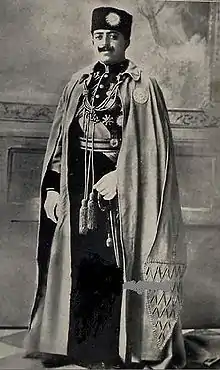
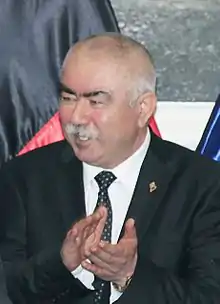
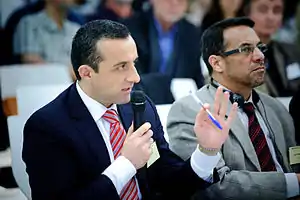
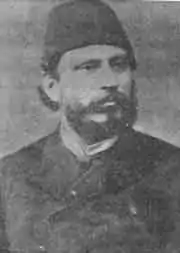
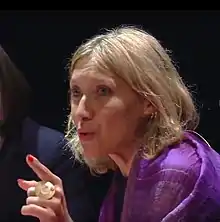

.jpg.webp)
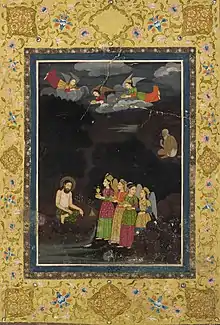
.jpg.webp)